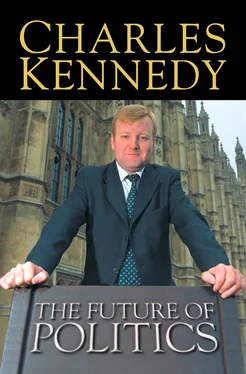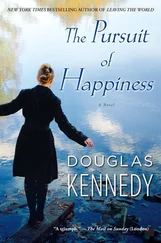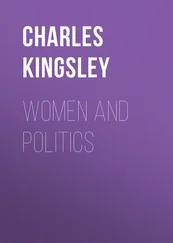Charles Kennedy

DEDICATION Dedication Preface to the Paperback Edition Introduction WHY AREN’T THE VOTERS VOTING? Chapter One FREEDOM FROM POVERTY: THE FORGOTTEN NATION Chapter Two FREEDOM TO BREATHE: THE GREEN FUTURE Chapter Three FREEDOM FROM GOVERNMENT: PEOPLE AND THE STATE Chapter Four FREEDOM TO INNOVATE: SCIENCE AND DEMOCRACY Chapter Five FREEDOM TO GOVERN: THE GREAT DEVOLUTION DEBATE Chapter Six FREEDOM WITHOUT BORDERS: BRITAIN, EUROPE AND THE CHALLENGE OF GLOBALIZATION Conclusion A SENSE OF IDEALISM Notes Index Acknowledgements About the Author Copyright About the Publisher
For my parents,
Ian and Mary Kennedy
Cover
Title Page THE FUTURE OF POLITICS Charles Kennedy
Dedication DEDICATION Dedication Preface to the Paperback Edition Introduction WHY AREN’T THE VOTERS VOTING? Chapter One FREEDOM FROM POVERTY: THE FORGOTTEN NATION Chapter Two FREEDOM TO BREATHE: THE GREEN FUTURE Chapter Three FREEDOM FROM GOVERNMENT: PEOPLE AND THE STATE Chapter Four FREEDOM TO INNOVATE: SCIENCE AND DEMOCRACY Chapter Five FREEDOM TO GOVERN: THE GREAT DEVOLUTION DEBATE Chapter Six FREEDOM WITHOUT BORDERS: BRITAIN, EUROPE AND THE CHALLENGE OF GLOBALIZATION Conclusion A SENSE OF IDEALISM Notes Index Acknowledgements About the Author Copyright About the Publisher For my parents, Ian and Mary Kennedy
Preface to the Paperback Edition
Introduction
WHY AREN’T THE VOTERS VOTING?
Chapter One
FREEDOM FROM POVERTY: THE FORGOTTEN NATION
Chapter Two FREEDOM TO BREATHE: THE GREEN FUTURE
Chapter Three FREEDOM FROM GOVERNMENT: PEOPLE AND THE STATE
Chapter Four FREEDOM TO INNOVATE: SCIENCE AND DEMOCRACY
Chapter Five FREEDOM TO GOVERN: THE GREAT DEVOLUTION DEBATE
Chapter Six FREEDOM WITHOUT BORDERS: BRITAIN, EUROPE AND THE CHALLENGE OF GLOBALIZATION
Conclusion A SENSE OF IDEALISM
Notes
Index
Acknowledgements
About the Author
Copyright
About the Publisher
PREFACE TO THE PAPERBACK EDITION CONTENTS Cover Title Page THE FUTURE OF POLITICS Charles Kennedy Dedication DEDICATION Dedication Preface to the Paperback Edition Introduction WHY AREN’T THE VOTERS VOTING? Chapter One FREEDOM FROM POVERTY: THE FORGOTTEN NATION Chapter Two FREEDOM TO BREATHE: THE GREEN FUTURE Chapter Three FREEDOM FROM GOVERNMENT: PEOPLE AND THE STATE Chapter Four FREEDOM TO INNOVATE: SCIENCE AND DEMOCRACY Chapter Five FREEDOM TO GOVERN: THE GREAT DEVOLUTION DEBATE Chapter Six FREEDOM WITHOUT BORDERS: BRITAIN, EUROPE AND THE CHALLENGE OF GLOBALIZATION Conclusion A SENSE OF IDEALISM Notes Index Acknowledgements About the Author Copyright About the Publisher For my parents, Ian and Mary Kennedy Preface to the Paperback Edition Introduction WHY AREN’T THE VOTERS VOTING? Chapter One FREEDOM FROM POVERTY: THE FORGOTTEN NATION Chapter Two FREEDOM TO BREATHE: THE GREEN FUTURE Chapter Three FREEDOM FROM GOVERNMENT: PEOPLE AND THE STATE Chapter Four FREEDOM TO INNOVATE: SCIENCE AND DEMOCRACY Chapter Five FREEDOM TO GOVERN: THE GREAT DEVOLUTION DEBATE Chapter Six FREEDOM WITHOUT BORDERS: BRITAIN, EUROPE AND THE CHALLENGE OF GLOBALIZATION Conclusion A SENSE OF IDEALISM Notes Index Acknowledgements About the Author Copyright About the Publisher
This preface is being written at home in Scotland over the Christmas and New Year holiday period, 2000–2001. At the time of writing my thoughts and political preoccupations are very much focused upon what lies ahead during the next twelve months for British politics in general, and the Liberal Democrats in particular. By the time this paperback edition appears we will more than likely have been through a general election – or be in the middle of the campaign.
Politics and politicians have taken a further beating over the last year. In particular, as the hardback edition of this book went to press in the summer of 2000, something remarkable happened in British politics: direct action, in the form of the fuel blockades, came to the towns and villages of Britain. I refer, of course, to the fuel crisis.
It was remarkable for several reasons. First, such action, organized by individuals rather than trade unions, is rare in Britain. In some Western countries, particularly France, taking to the streets is a much-used part of the political process – and it has achieved its aims on many occasions. Indeed, only a fortnight earlier, the French authorities capitulated in the face of domestic protests over fuel – perhaps sending a message across the Channel. Usually, the British have done things more gradually, believing ultimately that all problems will, at least to some degree, be resolved by a general election.
The second remarkable feature of the fuel protests was the issue itself. There has been rumbling discontent over fuel prices for many years, but except in a small number of constituencies (my own included) it had never been a major election issue – and certainly was not one of the main reasons for the Conservatives’ electoral eclipse in 1997, despite all that they had done to increase fuel taxes.
However, surely by far the most notable feature of the fuel protest was what it said about the state of politics itself. From all the diverse voices of the fuel protestors, one message came through loud and clear: the public want honesty on tax, and they are not getting it. If fuel taxes are necessary to protect the environment, people want politicians to say so – they do not want to be told, as they were by a government insulting their intelligence by seeking to shift the goalposts, that fuel taxes have now become necessary to pay for public services. Shifting the goalposts was exactly what Labour did. All parties had supported the principle that fuel taxes had an environmental objective when Norman Lamont introduced the fuel duty escalator (an automatic annual increase in fuel duty above the rate of inflation) in 1993. Indeed, Gordon Brown’s 1998 Budget was big on the link between fuel duties and the environment. He said then that, ‘only with the use of an escalator can emission levels be reduced by 2010 towards our environmental commitments’. He also spoke of the government’s ‘duty to take a long-term and consistent view of the environmental impact of emissions’. 1 Конец ознакомительного фрагмента. Текст предоставлен ООО «ЛитРес». Прочитайте эту книгу целиком, купив полную легальную версию на ЛитРес. Безопасно оплатить книгу можно банковской картой Visa, MasterCard, Maestro, со счета мобильного телефона, с платежного терминала, в салоне МТС или Связной, через PayPal, WebMoney, Яндекс.Деньги, QIWI Кошелек, бонусными картами или другим удобным Вам способом.
But by September 2000, Gordon Brown was telling the nation that ‘the existing fuel revenues are not being wasted but are paying for what the public wants and needs – now paying for rising investment in hospitals and schools’. 2 Конец ознакомительного фрагмента. Текст предоставлен ООО «ЛитРес». Прочитайте эту книгу целиком, купив полную легальную версию на ЛитРес. Безопасно оплатить книгу можно банковской картой Visa, MasterCard, Maestro, со счета мобильного телефона, с платежного терминала, в салоне МТС или Связной, через PayPal, WebMoney, Яндекс.Деньги, QIWI Кошелек, бонусными картами или другим удобным Вам способом.
The subsequent opinion polls over that summer told their own story. The Conservatives’ standing increased at the expense of Labour, as the Opposition inevitably does when the government faces a crisis. But the Liberal Democrats did better in the polls too – and our message was not a knee-jerk pledge to cut taxes, but a simple, restated pledge to be transparent as to the specific purposes of tax revenues.
Читать дальше













